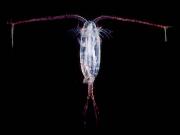Radio Program
Our regular Science and the SeaTM radio program presents marine science topics in an engaging two-minute story format. Our script writers gather ideas for the radio program from the University of Texas Marine Science Institute's researchers and from our very popular college class, Introduction to Oceanography, which we teach to hundreds of non-science majors at The University of Texas at Austin every year. Our radio programs are distributed at to commercial and public radio stations across the country.
There are many symbols of love, from the heart to red roses. And for some couples in Japan, it’s a glass vase -- the skeleton of a sponge.
Venus’s flower basket is a type of glass sponge. Various species of glass sponge are found around the world, usually in fairly deep waters. The largest concentrations of them form reefs off the coast of British Columbia.
Today, the word “trade” means to swap something. That hasn’t always been the case, though. Centuries ago, it meant a path or a track. The new definition blew in on the wind -- the trade wind.
Trade winds blow in belts that flank the equator. The Sun heats the air and oceans at the equator. Warm, humid air then rises and heads toward the poles. As it reaches about 30 degrees north and south of the equator, the air cools and descends.
From November through April, a tiny marine creature is pretty common in the coastal waters of the northern Gulf of Mexico. It’s a species of copepod. It looks like a cross between a flea and a shrimp, but it’s only about a millimeter long.
When you walk on a tattered carpet or a stained-up rug, you don’t usually worry about it lunging up and biting you. Unless, that is, you happen to be walking through shallow coastal waters around Indonesia or parts of Australia. In those areas, the carpet just might give you a nasty shock.
Hanging out in the water while a hurricane is bearing down sounds a little scary. But that’s just what some underwater “gliders” are doing. They’re recording ocean conditions before, during, and after hurricanes pass overhead. That’s helping scientists improve their forecasts of hurricane intensity.
The squid has quite a nerve. In fact, it has the biggest nerve fiber in the animal kingdom -- a thousand times wider than the typical human fiber. That’s made the squid a good subject for learning about how nerves work -- and how they can misfire.
The massive squid nerve fiber is known as a giant axon. It forms a ring around the creature’s esophagus, and it’s protected by a hard cap. The axon is up to a millimeter wide.
The Caribbean Sea is known for its tourist-attracting wonders: sandy beaches, coral reefs, and beautiful blue-green waters. But the deepest part of the sea is full of geological wonders. Parts of Earth’s crust there are moving apart. That’s created a long, deep trench, along with metallic “chimneys” that belch dark, super-heated water.
If you really want to see “jaws,” forget about great white sharks. Instead, look for the sarcastic fringehead. It’s a little fish -- no more than a foot long. But the male fringehead can spread his jaws wider than the length of his body. And it’s not just for show. He’ll attack just about anything that enters his territory.
The sarcastic fringehead gets its name from its behavior and its appearance -- it’s aggressive and fearless, and it has little filaments above its eyes that look like fringe.
Most of the time, an icebreaker that doesn’t plow through the ice is about as useful as a car without wheels. But a German icebreaker is scheduled to make an important scientific expedition -- while frozen inside the ice.
The Research Vessel Polarstern will study the Arctic for a year. The mission’s goal is to collect information that will help scientists develop better models of how the climate is changing.
Black corals are different from most coral species. Most coral “skeletons,” for example, are made of calcium carbonate -- the mineral that makes up chalk. The skeleton of a black coral, though, is made of proteins and chitin -- the stuff that makes up insect skeletons. And black coral doesn’t rely on algae to provide most of its food. Instead, it feeds on tiny organisms that drift by on the currents.
And there’s one other difference. In the United States, black corals from Hawaii are the only species that can be legally harvested to make jewelry.












